An ongoing “bike backlash” and “war on cars” pushed by the local media, biking as a wedge-issue in political campaigns, fear from politicians about doing “too much” for bikes — sounds like Portland right? Well, Seattle (not to mention New York City and many others) suffers from the same illusion. Now, a new survey commissioned by Seattle’s Cascade Bicycle Club could help tamp down this pervasive — yet false — narrative.
According to a memo (PDF) about the survey from public opinion research firm Fairbank, Maslin, Maullin, Metz & Associates, the results provide, “absolutely no evidence of widespread anti-cycling sentiment in Seattle.” The memo goes on to explain that (among other things) 78% of those surveyed ride a bike at least once a year, 45% ride monthly, and 60% say they’d like to ride more*.
While the perception of people who ride bikes has become the butt of jokes, the Seattle survey found that people, “overwhelmingly report positive feelings towards the City’s bicyclists.” 78% say they have a “favorable opinion” of people who ride bikes, including 38% who said “very favorable” (just 19% said their opinions of people who ride are “unfavorable”).
“These findings provide strong evidence that the “bikelash” occasionally touted in the media is sentiment shared by only a small minority of voters, and dismissed out of hand by the majority.”
— Fairbank, Maslin, Maullin, Metz & Associates
The survey — which was completed via a phone survey of 400 registered voters — also asked about infrastructure investments. A whopping 59% of respondents said they support investing in giving people more transportation choices, “even if it means replacing some lanes on our roads and removing some on-street parking for protected bikeways.” And a majority (53%) said they support protected bike routes that connect the city.
And that “war on cars” we hear so much about? 51% of those surveyed said they don’t believe the hype.
If you’re wondering why so many people support protected bike lanes and redesigning streets to make room for them; it’s likely because even people who mostly drive get nervous with bike riders so close. No one wants to collide with another road user. This stress often leads to anger (road rage) and hard feelings, but it comes from a place of concern that is shared by people on both sides of the windshield.
Download the six-page report on the survey here (PDF). You can also read more about the survey from Seattle’s weekly paper, The Stranger.
Here in Portland, no politicians are silly enough to be blatantly anti-bike. However, because of the fake controversies and over-politicization of bicycles during the Sam Adams era, bicycling suffers from a bit of an image problem. I’d love to see results of a similar survey taken in Portland.
•The survey has a margin of sampling error of +/-4.9%



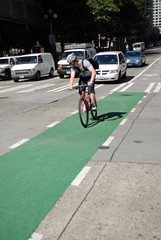
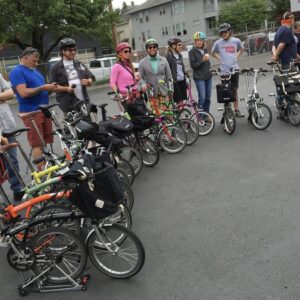
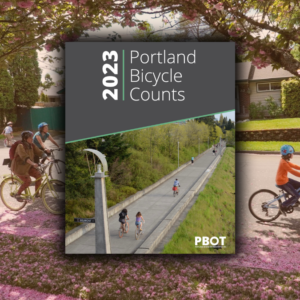
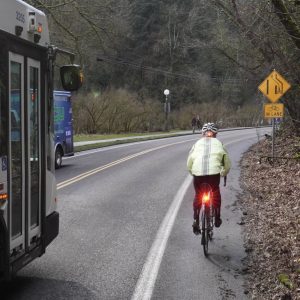
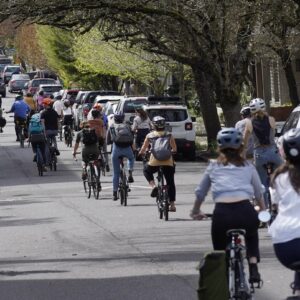
Thanks for reading.
BikePortland has served this community with independent community journalism since 2005. We rely on subscriptions from readers like you to survive. Your financial support is vital in keeping this valuable resource alive and well.
Please subscribe today to strengthen and expand our work.
I’ve become a bit of a Jeff Speck convert since reading Walkable City and following him on Twitter (@jeffspeckaicp), and I’m now rather leery of replacing on-street parking with bike facilities. Speck makes a persuasive case for on-street parking’s economic and safety advantages. As a daily user of the new Multnomah reconfig, I have to agree: riding feels pretty darn safe with a steel barrier of parked cars between me and the moving ones.
blocking the visibility of cyclists at intersections does not feel safe to me. nor is it considered to be safe in copenhagen or amsterdam.
What if we design it so the standard for every block is (assuming no mid-block driveways): 6 car parking spots, 2 spots for bike corrals, and then 2 open spots. By mid-block, the line of sight to the right is clear, so right-hooks should be less of a problem.
just try to convince the city of Portland or local businesses of that, won’t happen.
So the solution is door-zone bike lanes? Or are you advocating sharrows everywhere?
for the price of a half mile of flawed PBOT cycle track we could carpet many miles with 8+ foot wide buffered bike lanes.
I didn’t advocate for invisibility at intersections, and I’m pretty sure Jeff Speck doesn’t either. There are better-designed versions of the steel barrier approach (SW Moody) and less brilliant ones (NE Multnomah). I’ve found my visibility at intersections on Multnomah to be manageable, and trading an itty-bitty lane next to buses for a nice wide separated lane with some caution at a couple of intersections, feels like a net benefit to me.
In Portland, I don’t think you’d find different numbers if you were looking for some kind of anti-bike coalition. But when you started talking about funding and project priorities, that’s when I suspect the percentages would turn against bike infrastructure. Fortunately, I think that BoJack and his 25 sycophants are not going to run or win the debate.
I *just* had a debate with someone last week about “all the sewer money Sam Adams spent on bike lanes!”. So tiring trying to argue that, no matter that the money improved “neighborhood greenways”, which are open to any mode of transit including bikes – and not “bike lanes”.
The difference is very important but lost on people who don’t bike.
Not to mention that no sewer money funds were spent on bike lanes or paths. Every cent went to storm water run off abatement in the form of bio-swales.
Remember the Big Pipe Project, the reason our water bills are so high in the first place? Remind the anti-bike people that that project wouldn’t have been necessary if we didn’t have so much pavement (streets and parking lots) dedicated to automobile use. No gas tax or registration funds are being used to help pay for that!
“it’s likely because even people who mostly drive get nervous with bike riders so close.”
if a motorist were truly concerned about other road users they could slow down and/or drive more cautiously.
“No one wants to collide with another road user. This stress often leads to anger (road rage)”
i don’t think that amsterdam and copenhagen achieved high cycling mode share by making urban motoring less stressful for motorists.
I actually found myself agreeing strongly with the portions you quote. Entirely my subjective speculation, of course, but yes I think many drivers are afraid of hitting cyclists (whom we must admit sometimes do behave unpredictably on the roadways) And I think this fear engenders anger (how dare you put me at such risk – for heartache, for police involvement and financial consequences?!?).
Drivers often cite (yelling) the delay they believe cyclists subject them to, yet drivers put up with delays from all sorts of other legitimate road users; nobody yells at a school bus when the red lights start flashing.
But let us never pretend we’re Amsterdam or Copenhagen. Motorist have a lot of political clout – even here in the northwest. Even though I’m infrastructure-agnostic myself I think this report is heartening. Certainly reading the comments on any story involving cycling in the Seattle papers (including the Stranger) would lead one to believe cyclists are widely reviled and disrespected. Let’s build on the good rather than hating ourselves because we don’t have to political will to become a Scandinavian social democracy… because we don’t.
My sense, is that when driving amongst people biking, what generally responsible people may sometimes be nervous and anxious about, is people on bikes that do not travel according to at least, basic rules of the road.
The result being unsafe actions taken by vulnerable road users, putting themselves in a position of danger from motor vehicles.
While many people can and do safely maintain control of their motor vehicles, no control on their part, exists over the manner people choose to ride bikes on the road.
“While many people can and do safely maintain control of their bicycles, no control on their part, exists over the manner people choose to drive cars on the road.”
There, fixed it for you.
You posted a smart alec response, modifying my statement, apparently in an attempt to shift attention away from insufficient assumption of road use responsibility by some cyclists, but you haven’t ‘fixed’ anything.
While true that cyclists can’t control the actions of drivers, people that bike being the vulnerable road users they are, do much, when they follow rules of the road, and use various means to enable their visibility to other road users, to enable the vast majority of the 80-90 percent of the people on the road driving or traveling by motor vehicle…to help enable people driving to offer people that bike, safe passage on the road.
The Seattle survey strongly suggests, as I’ve long thought to be the case in the Portland metro area, that most people driving generally support the use of bikes on the road. Something else constructive a relatively simple survey such as the Seattle survey might be able to do, is attempt to examine more closely why people that drive may as bikeportland’s publisher-editor J Maus has concluded “…get nervous with bike riders so close. …”.
Separated bike lanes and cycle tracks can be good, but there’s no way they’re going to be commonplace in our area, at least not soon.
On the other hand, more cyclists taking the initiative to overcome their inherent vulnerability amongst motor vehicle using road users, by adopting more consistent compliance with rules of the road and generally safe road use procedures specific to bike use, may do much to improve travel conditions for the vast majority of other road users traveling by bike and car.
To address the first paragraph, I read this as trying to point out that no one has control over any other person’s road behavior regardless or mode.
You keep asserting that people on bicycles do not follow basic rules of the road. I would assert that a non-zero portion (probably a majority) of the populace does not follow the basic rules of the road. Daily, I see violations of posted speed, cell phone usage, stop-sign compliance, road usage under intoxicates, safe passing, etc. from people in cars, in buses, and on bicycles alike.
Your comments in this thread are slanted to propagate a car versus bike sentiment. I do not appreciate them.
Sorry about the snark. My point is, as has been said my many others before, why are we all held to be ambassadors for our “group”, and judged by the worst riders, when the same is not true for drivers?
Your point is, who cares if it’s fair, it affects public opinion regardless. Which is entirely true.
But, there are a couple of issues here. One: sometimes what I do to be safe is not often the most legal thing. Two: being safe and/or legal is not always perceived as such by some drivers. That’s where it becomes very hard to satisfy that residual 19%. Maybe we can’t reach them, until our infrastructure improves.
my sense, when i occasionally rent a zipcar or car2go and find myself following a bike down the street, or simply driving on a neighborhood collector at twenty-five mph with parked cars along both sides of the road and not much visual connection to what might lie behind, is that i am operating this large, unwieldy thing that could easily hurt or kill someone, and that the “unpredictability” factor — which is excruciatingly real — is relative to my capacity to destroy.
The real reason for the hype and mytical “Bikes vs. Cars” wars is that the myth is supplied by the media, who by and large rely upon advertising from automobile dealers, manufacturers, and suppliers to pay thier bills.
You could also ad (pun intended) other industries as well that benifit from keeping the bikes down because of other side effects of more people cycling. Big pharm, gyms/health clubs, fast food (particuliarly those that sell mostly from the drive-through), radio stations… The list goes on.
And I don’t think bikes will ever compete in ad dollarts even if the riding population was the majority of transportation users.
“just 19% said their opinions of people who ride are “unfavorable””
Unfortunately that means that 1 in every 5 people you encounter holds an unfavorable position toward cyclists. Yes, I know, that sounds like I am looking at the negative side of things, but that translates to 1 in every 5 cars and that can be a lot of cars in a car-congested city. I suspect, too, that percentage varies by neighborhood. Be careful out there. The minority of the population who cycle are ambassadors for change and can positively (or negatively) influence the 1 in 5 motorists that think unkind thoughts.
“…”just 19% said their opinions of people who ride are “unfavorable””
Unfortunately that means that 1 in every 5 people you encounter holds an unfavorable position toward cyclists. …” Pat
According to the survey, one in every 5 people driving has an unfavorable opinion of people that ride.
If they, and the percent of people riding that hold an unfavorable opinion of people that drive, could somehow be brought to practice co-operative road use procedures used by the majority of people traveling by bike and car, that would be an improvement.
but we would still be allowed to hate each other, right?
“According to the survey, one in every 5 people driving has an unfavorable opinion of people that ride.”
I doubt that most of those who have an unfavourable opinion would change their opinion if a few cyclists stopped “blowing” stop signs.
The link to the Stranger article is broken.
“If you’re wondering why so many people support protected bike lanes and redesigning streets to make room for them; it’s likely because even people who mostly drive get nervous with bike riders so close.”
Look no further if you are seeking an answer to why we need cycle tracks or even bike lanes – motorists basically don’t want to share the road; they want cyclists out of their way.
I love riding my bike in Seattle, every day.